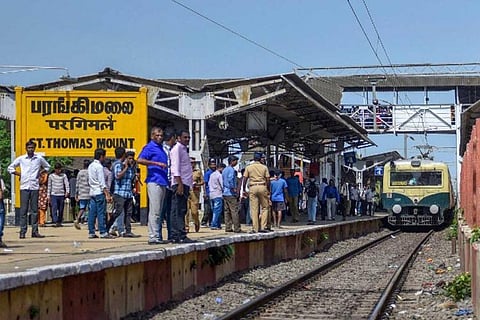

Written by H.B. Kiruba
In India, long distance travels are synonymous with long train journeys, for train journeys are considered the safest, most comfortable, and relatively affordable form of commute. However, the Odisha train accident has affected the implicit trust in the safety of train journeys. The collision has turned out to be a prolonged nightmare for the Indian citizens, as many wait to identify deceased kin by the photographs of their severed heads.
All the same, the public, the daily commuters of the Chennai city who depend on the Chennai Suburban Railways, for instance, stick to the trains. No dip in passenger numbers has been reported. So what is the chatter on the tracks? TNM took a train from Nungabakkam to Beach Station in the city to know what passengers had to say about rail safety in the aftermath of the accident, and understand their concerns.
Shanti, a sweets vendor on the Beach-Tambaram route, says that while she continues in her old line, her college-going niece who usually tags along with her, refuses to join her after the accident. “I think she will continue to keep off until the Odisha accident ceases to be the subject of our headlines. We’re all shaken,” she adds.
“Last month, at the Saidapet railway station, a train coach got detached from the rest of the train. Fortunately, it didn’t become a headliner as no one was hurt,” says a middle school teacher, recalling the unexpected detachment of train coaches that took place on May 16 at Saidapet. Fellow passengers nodded in agreement.
A group of students from the University of Madras awaiting their train at Chepauk station agree that the Odisha accident is frightening, but they feel that the alternative of bus travel is even more daunting. “I’m used to taking trains in this city and always prefer the ladies' compartment to others. This accident hasn’t really changed that for me. I travel from Avadi every day and find only trains to be time and cost effective,” Sushmitha Udayashankar, a student from University of Madras says.
People continue to travel by train within the city as they consider it hassle-free, despite knowing the risks associated with it. “There is a risk in everything we do. Anyway people like us who work for daily wages risk our lives to earn our livelihood. We can only hope that the government wakes up and plug the loopholes and not allow another such horror to take place,” says Dhanapaul, a construction worker. “Accidents are prone to occur on roads as well as on tracks. We choose the train because it is the fastest and cheapest,” he adds.
Trains seem to be the most preferred form of transport in the city, but it is no longer considered to be the safest. While initiatives like the launch of Vande Bharat Express are appreciated, what is required is increased safety measures and better amenities.
B Guganesan, Chief Public Relations Officer of Southern Railways regarding passenger safety, says, “The passengers can call the all-purpose Railway helpline 139 when they feel threatened. We have advertised the helpline on our social media pages. As for amenities, we do whatever possible. All the protocols are scrupulously followed and regular checks are conducted to ensure the safety of passengers.”